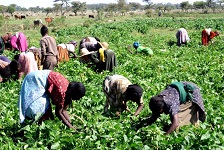By Andualem Sisay Gessesse – Ethiopia is a country located in the Horn of Africa and is known for its predominantly agrarian economy.
Agriculture plays a vital role in the country’s overall development, contributing significantly to its GDP, employment, and food security. This comprehensive response will delve into various aspects of agriculture and food security in Ethiopia, including the challenges faced, government initiatives, and the impact on the population.
Importance of Agriculture in Ethiopia
Agriculture is the backbone of Ethiopia’s economy, employing over 70% of the population and contributing around 34% to the country’s GDP. The sector provides livelihoods for millions of smallholder farmers who rely on rain-fed agriculture for their sustenance. Additionally, agriculture accounts for a significant portion of Ethiopia’s export earnings, with coffee being one of the primary commodities.
Challenges in Ethiopian Agriculture
Despite its importance, Ethiopian agriculture faces numerous challenges that hinder its growth and potential. Some of these challenges include:
1. Climate Change: Ethiopia is highly vulnerable to climate change, experiencing recurrent droughts and erratic rainfall patterns. These climatic variations pose a significant threat to agricultural productivity and food security.
2. Land Degradation: Soil erosion, deforestation, and unsustainable land management practices contribute to land degradation in Ethiopia. This leads to reduced agricultural productivity and poses long-term threats to food security.
3. Limited Access to Inputs: Smallholder farmers often face challenges in accessing quality seeds, fertilizers, and other agricultural inputs due to limited availability or high costs. This hampers their ability to improve productivity and adapt to changing climatic conditions.
4. Lack of Infrastructure: Inadequate rural infrastructure, such as roads, irrigation systems, and storage facilities, limits farmers’ access to markets and reduces post-harvest handling capabilities.
5. Low Productivity: Ethiopian agriculture suffers from low productivity levels due to various factors, including limited access to modern farming techniques, inadequate extension services, and low adoption of improved technologies.
Government Initiatives
The Ethiopian government recognizes the importance of agriculture and has implemented several initiatives to address the challenges faced by the sector. Some notable government interventions include:
1. Agricultural Transformation Agency (ATA): The ATA was established in 2010 to support smallholder farmers and promote agricultural growth. It focuses on improving productivity, market access, and resilience through various programs and interventions.
2. Productive Safety Net Program (PSNP): The PSNP is a social protection program that provides cash or food transfers to vulnerable households during periods of food insecurity. It aims to reduce the impact of shocks on rural communities and enhance their resilience.
3. Climate-Resilient Green Economy (CRGE) Strategy: The CRGE strategy aims to promote sustainable development while addressing climate change challenges. It includes initiatives to improve land management practices, promote renewable energy, and enhance climate resilience in agriculture.
Impact on Food Security
Food security remains a significant concern in Ethiopia, with millions of people facing chronic food insecurity and malnutrition. The challenges faced by Ethiopian agriculture directly impact food security in the country. Erratic rainfall patterns, droughts, and land degradation contribute to reduced agricultural productivity and crop failures, leading to food shortages.
However, efforts are being made to improve food security in Ethiopia. The government’s initiatives mentioned earlier aim to enhance agricultural productivity, increase market access for farmers, and build resilience against climate change impacts. Additionally, international organizations and development partners provide support through various programs focused on improving agricultural practices, enhancing nutrition, and strengthening value chains.
In conclusion, agriculture plays a crucial role in Ethiopia’s economy, providing employment opportunities for the majority of the population and contributing significantly to GDP. However, the sector faces numerous challenges such as climate change, land degradation, limited access to inputs, and low productivity.
The Ethiopian government has implemented various initiatives to address these challenges and improve agricultural productivity, market access, and resilience. Despite these efforts, food security remains a concern, and further interventions are required to ensure sustainable agricultural development and improved nutrition for the population.

